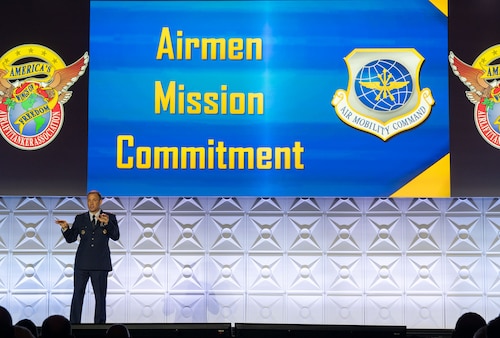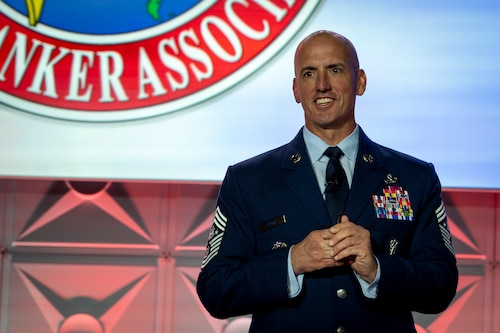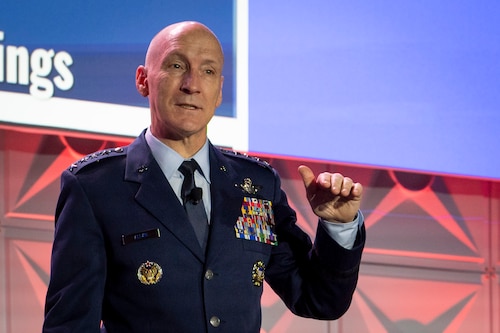The 56th Airlift/Tanker Association Symposium gathered Air Force and Joint Force leaders, civic leaders, industry representatives and more than 1,000 current and former Airmen to underscore the critical role of the U.S. Air Force in a rapidly shifting global landscape, Oct. 31 to Nov. 3.
With a focus on reoptimizing for Great Power Competition, speakers highlighted the strategic necessity of agile and resilient air mobility forces to counter threats, particularly from the People's Republic of China.
Gen. Johnny Lamontagne, Air Mobility Command commander, kicked off the event with a keynote speech celebrating a landmark year for AMC. He also revealed his commander's intent, grouped in three categories: Airmen, Mission and Commitment.

U.S. Air Force Gen. Johnny Lamontagne, Air Mobility Command commander, speaks to nearly 1,000 Airmen during the 56th Annual Airlift/Tanker Association Symposium, Oct. 31, 2024, in Grapevine, Texas. Lamontagne kicked off the symposium introducing his commander's intent and bucketing it into three focus areas: Airmen, mission and commitment. (U.S. Air Force photo by Staff Sgt. Dalton Williams)
"It starts and ends with the Airmen," he said, defining the role of mission-ready Airmen who are accountable to themselves and one another, and empowered to lead resiliently.
His focus on mission emphasized the importance of guaranteeing the nuclear mission and enhancing digital connectivity for integrated command and control and to mitigate threats, a theme echoed by other senior leaders throughout the symposium.
Lamontagne previewed significant updates to AMC's structure and capabilities, including a white sheet review of the command's employment of aeromedical evacuation and global air mobility support system capabilities, aimed at prioritizing effectiveness in great power conflict. He also announced the next iteration of AMC's flagship exercise, Mobility Guardian, set for summer 2025 in the Pacific, which will advance and support joint and multinational training to prepare for peer conflict.
In early October 2024, Lamontagne hosted a senior leader offsite focusing on the tasks at hand for GPC, tasking leadership to address challenges and develop operational priorities relevant to the command. The three-day symposium shared a similar sentiment across senior leaders: mobility forces play a crucial role in the future fight.
On the second day of the symposium, Secretary of the Air Force Frank Kendall continued the theme of readiness and adaptation, addressing the critical need to align mobility force capabilities with the evolving threat landscape.
Kendall outlined his three main pillars: modernization for competitive advantage, organizational restructuring for GPC, and resource adequacy. Warning against complacency, Kendall pointed to historical lessons of adapting tactics to overcome formidable opponents.
"For a long time, we've been able to operate relatively freely…China has, like the Soviet Union, adapted. So must we," Kendall said.
His emphasis on strengthening airbase resilience and advancing tanker capabilities resonated with Lamontagne's focus on fleet modernization. Kendall closed by acknowledging the Total Force mobility team's commitment, which keeps aircrews on the move around the clock, sustaining the global reach that underpins U.S. deterrence and readiness.
Chief Master Sgt. of the Air Force David Flosi echoed the sense of urgency in his keynote, urging Airmen to remain mission-focused and resilient amid ongoing reoptimization. He stressed the significance of countering PRC aggression, which he described as a systemic threat to international security and stability.

Chief Master Sgt. of the Air Force David Flosi addresses more than 1,000 Airmen, community leaders and industry partners during the 56th Annual Airlift/Tanker Association Symposium, Nov. 1, 2024, in Grapevine, Texas. Flosi stressed the importance of Rapid Global Mobility and its vital role in an era of Great Power Competition. (U.S. Air Force photo by Staff Sgt. Dalton Williams)
"Our Airmen have always been there when the world gets messy," Flosi said, who highlighted Total Force initiatives in the Pacific, including AUKUS tri-lateral operations with Australian and United Kingdom partners, which illustrate the necessity of allied integration in preparing for future conflicts.
Flosi emphasized that mobility Airmen are crucial to Rapid Global Mobility and called on Airmen to continue adapting to challenges while sourcing innovative ideas for the path ahead.
Chief Master Sgt. Jamie Newman, AMC command chief, said Total Force Airmen are handling challenges every single day, giving an example from his past to highlight the strength of the U.S. Air Force's noncommissioned officer corps.
"As a young Airman, an air crew took us into an airstrip...they took a plane that was working and left the broken plane with [me] and my Raven partner for five days... no communication, no expectation, no food, no water for five days," Newman said. "The air crew got on the other plane, and they left. They didn't leave behind directions. They didn't ask us what we thought."
His story showcased the ability of empowered, competent, and well-trained Airmen finding solutions on the go and their ability to operate in contested environments. Lt. Gen. John Healy, Chief of Air Force Reserve, and commander, Air Force Reserve Command, echoed the confidence leaders have in today's Airmen.
"We need to start pushing this level of risk, understanding of risk, mitigation of risk, down to the lowest levels," Healy said, driving home the importance of flat decision space and empowered Airmen. "It's very likely that we're going to have a cell of 20 folks out on some second island chain with 8,000 feet of runway or road in front of them. And this might be a master sergeant or a senior master sergeant responsible for understanding the risks associated with getting F-35s in and out and making them successful or not
"We need now to make sure that we're engendering that trust and that support, that leadership trust in those NCOs to be able to do that," Healy continued. "And I know our NCO corps is up to the task of this. No question about that. But we need to start practicing that right now."

U.S. Air Force Chief of Staff Gen. David Allvin speaks to more than 1,000 Airmen, community leaders, and industry partners during the 56th Annual Airlift/Tanker Association Symposium, Nov. 2, 2024, in Grapevine, Texas. Allvin emphasized the necessity of the Air Force to project power, develop people, generate readiness, and develop capabilities while stressing the significance that Mobility Air Forces will have on the future fight. (U.S. Air Force photo by Staff Sgt. Dalton Williams)
Continuing to beat the drum on reoptimization for GPC, Chief of Staff of the Air Force Gen. David W. Allvin acknowledged that the Airmen in attendance make up the team that will change the Air Force to one that privileges speed and tempo, and resilience and agility, as the character of war evolves for the future fight.successful."
"We've inherited a legacy of excellence, and we stand of the shoulder of giants who have done this year over year, and deliver for our Air Force, for the rest of our services, for the joint community, for our nation," Allvin said, referring legacy of mobility forces. "But that's today, what's tomorrow?"
According to Allvin, "this" is the mobility moment.
"So, what I'm asking is pick up the pen, and let's write this next chapter together." he said, charging the audience with action.

U.S. Air Force Gen. Randall Reed, U.S. Transportation Command commander, speaks to more than 1,000 Airmen, community leaders and industry partners during the 56th Annual Airlift/Tanker Association Symposium, Nov. 2, 2024, in Grapevine, Texas. Reed closed the symposium with thoughts on mobility culture and the importance of Airmen's readiness and resolve while they reoptimization for the Great Power Competition and maintain global support to combat commands. (U.S. Air Force photo by Staff Sgt. Dalton Williams)
Gen. Randall Reed, U.S. Transportation Command commander, closed the symposium with the thoughts of focusing on mobility culture and the long legacy.
"...We look back at the legends who came before, and we had the audacity to ask one simple question... are they better than us or is it simply our turn?" Reed said. "Inside of you, you have what it takes. Inside of you, you know what to do. And above you, we're doing everything we can to equip you."
The 2024 Airlift/Tanker Association Symposium illuminated the path forward for Rapid Global Mobility, underscoring the strategic and operational shifts required to maintain a competitive edge. Over the three-day symposium, attendees were given access to nine different keynotes and 22 seminars. As threats from peer competitors grow, the symposium served as a reminder of the indispensable role of mobility, not only in executing current missions but in preparing for future conflicts where readiness and resilience will be decisive.






